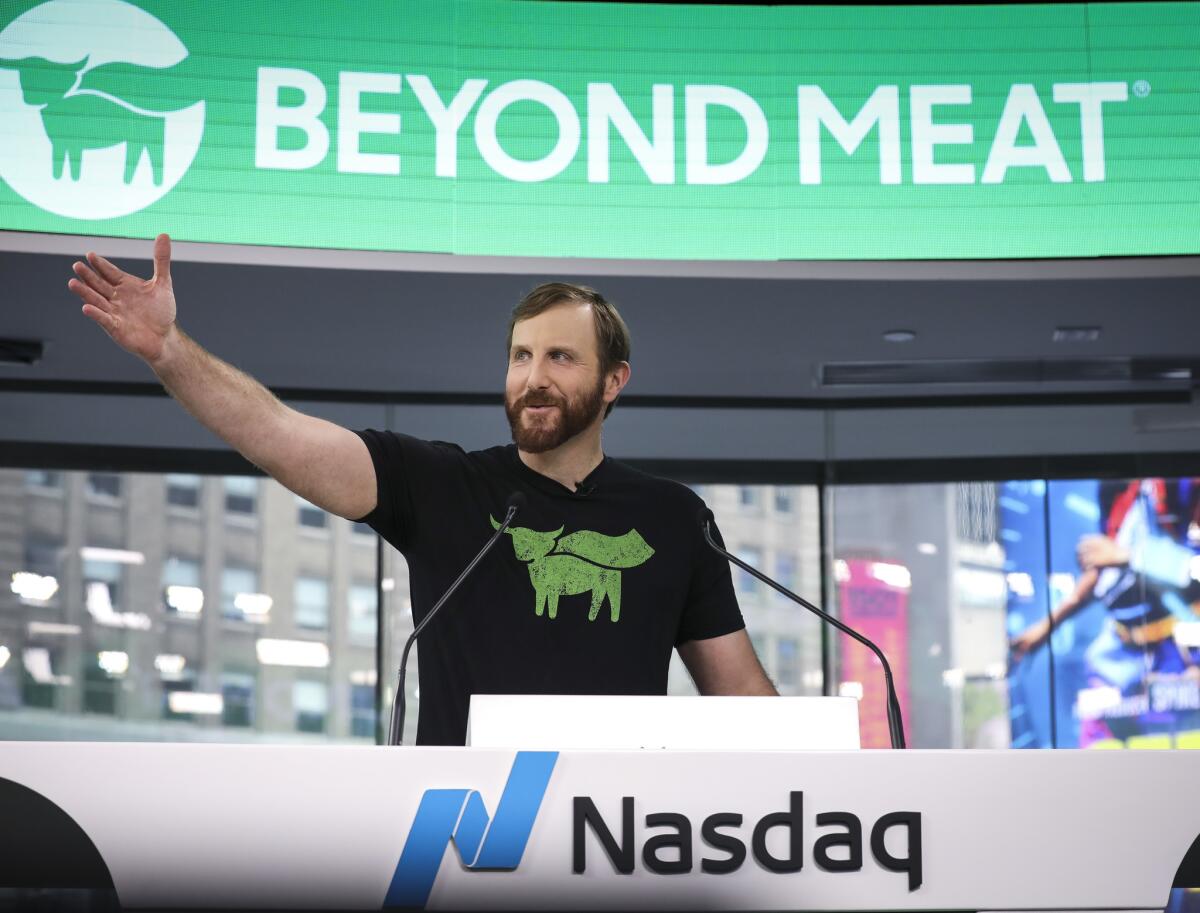Short-sellers sink teeth into Beyond Meat

Shares in Beyond Meat have lost their sizzle, with investors placing increasingly bearish bets on the company that launched one of the most successful public offerings in the U.S. this year.
Equity analysts have been cautioning against an overheated share price since the plant-based meat substitute group’s stock soared after its initial public offering in May. Short-sellers now account for 47% of Beyond Meat’s freely traded shares — the second highest ratio in the Russell 1000 index of the biggest U.S.-listed companies, according to Bloomberg data.
Beyond Meat’s flotation coincided with rising consumer enthusiasm over plant-based protein alternatives. After a market debut at $25 a share in early May, the stock hit an intraday peak above $230 in July. But it has been mostly downhill since. On Wednesday the stock slipped 8%, dipping below $100 for the first time since June, before recovering 3.9% on Thursday, to $101.70.
“We really think sentiment has been driving the share price rather than fundamentals,” said Arun Sundaram, analyst at CFRA. The independent research firm began covering the stock earlier this month with a “sell” rating.
Short sales of the stock have ballooned ahead of the expiration of the company’s “lockup period” on Tuesday, which will allow company insiders and pre-IPO investors to start cashing out of their holdings for the first time. The El Segundo company is due to report third-quarter earnings a day earlier, after the bell.
There is, it would seem, nothing but bleak news in U.S. farm country. Soybean prices are down.
Up to 48 million shares, or about 80% of the outstanding stock, are set to become eligible to be freely traded in the public market. Given the still-dramatic price rise since the IPO, many insiders and venture capital funds are expected to sell their shares, putting further downward pressure on the stock, said Sundaram. The increased availability of shares in the market in turn is expected to make it easier for short sellers to borrow the stock, he added.
The shift in sentiment has come despite Beyond Meat’s positive announcements over the last few months, including McDonald’s testing a plant-based burger in Canada using the company’s patties as well as a nationwide rollout of the Beyond Sausage sandwich by Dunkin’ in the U.S.
Investments in plant-based options have ballooned over the last few years, with some forecasters predicting that substitutes will account for 10% of the $1.4-trillion global meat industry over the next decade. Last year investment in such start-ups totaled $315 million, according to the Good Food Institute, a nonprofit advocacy group for alternative proteins.
Nevertheless, the increasing competition in the plant-based protein sector has led to concerns among some market-watchers.
“While Beyond Meat may have been among the early movers, barriers to entry are very low,” wrote analysts at Exane BNP Paribas in their latest report. The broker has an “underperform” rating on the shares and a target price of $70, the lowest among analysts covering the stock.
Large food groups such as Nestlé, Tyson, Kellogg and Hormel are in the process of entering the category, all of them with more resources to spend on research and development, the Exane analysts noted.
White-label food manufacturers are also likely to enter the plant-based meat substitute market, intensifying competition. “We question whether branded burgers will have a permanent material presence in food service,” the analysts wrote. “They do not in the meat version, so why would plant-based equivalents?”
The most-shorted stock in the Russell 1000 is Match Group, according to Bloomberg data, where 50.9% of the free float is on loan to short-sellers. Match Group operates dating sites including OKCupid, PlentyofFish and Tinder.
© The Financial Times Ltd. 2019. All Rights Reserved. FT and Financial Times are trademarks of the Financial Times Ltd. Not to be redistributed, copied or modified in any way.
More to Read
Inside the business of entertainment
The Wide Shot brings you news, analysis and insights on everything from streaming wars to production — and what it all means for the future.
You may occasionally receive promotional content from the Los Angeles Times.










